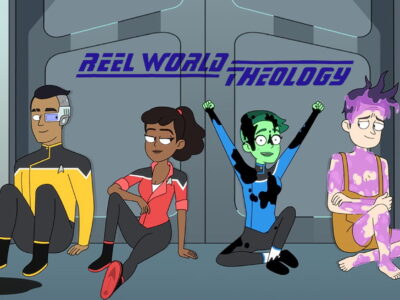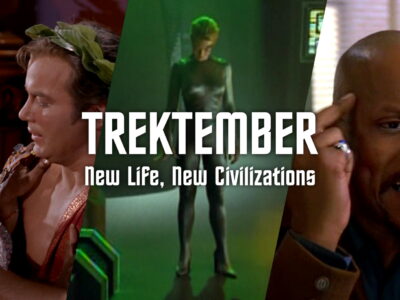Trektember: The Visitor
I used to think my parents were weird. They would often tell me how impossible it was to explain a parent’s love for their child, so they would simply say “you’ll understand one day.” Yeah sure, I thought before brushing it aside. And you can probably guess where this is going. Now as a father myself I can confirm they were right. It really is quite hard to explain what a parent’s love is like, but we get a very real glimpse of it in “The Visitor,” one of Star Trek: Deep Space Nine‘s absolute best episodes.
The story is uniquely sci-fi in its premise. An accident causes Captain Sisko to disappear into thin air right in front of his son Jake. It seems as if he was killed in the accident, but he briefly reappears to Jake some weeks later, and again a whole year later. He is trapped in a place outside of time, and the gaps between his reappearances grow longer each time. Jake is forced to carry on with his life as if his father was indeed gone forever, but as Sisko keeps reappearing to Jake over the course of his adult life, Jake begins obsessing about bringing his father back; at one point leaving his career as a writer and even losing his marriage over it.
What Grief Can Do
This is partly a story about grief. The episode is narrated by an elderly Jake, talking to a young writer who sought him out at his home. He reflects on the mistakes he made and what his life became in the wake of his father’s not-quite loss. Jake never really deals with the grief, and one can hardly blame him; knowing that his father isn’t dead, but alive and somehow linked to him. His journey is therefore marred by it, and we watch as it changes him. Sisko the father, however, goes on a much different journey than that of his son.
Avery Brooks has spoken about how important the father-son relationship between Ben and Jake Sisko was on Deep Space Nine. At a Trek convention in 2012 he explained, “(Their relationship) was something else you still don’t often see on air, at least as it concerns black and brown men and their sons. We got to play complicated, emotional and intricate scenes, and we got to have tender and fun moments. It wasn’t a pat relationship or an easy one, and it was very realistic.” As affected as I am by the very intimate and organic father and son moments in this episode, I can only imagine the impact it could have on someone who rarely saw this type of representation on TV. This, to me, is the crux of their relationship, where the threads are laid bare and we really see not just what Ben means to Jake, but what he is willing to do for his son.
What makes this episode so exceptionally powerful is the clear and willingly-accepted sacrifice that Sisko tries to make for his son through each interaction. It is Sisko’s deep concern for his son, and complete lack of concern for himself, that I can attest as a parent is as real as it gets. As the crew tries to keep Sisko present during one of his initial reappearances, Sisko’s first and primary concern is to how Jake is doing. As Jake breaks down in tears, his father comforts him. “It’s alright,” his father tells him, “everything is going to be alright.” He makes sure to tell him it’s not his fault. He kisses him and wants to know if he will be okay as he disappears again.
Many years later, Sisko reappears to find Jake married and living as an accomplished writer. Jake is overcome by guilt, apologizing to his father, saying he shouldn’t have given up on him. Sisko immediately dismisses it, instead pointing out how proud he is of his son’s accomplishments and showing no concern over his own missed life. After he disappears yet again, the elderly Jake narrator goes on to explain how he then became obsessed over bringing back his father. In a final attempt to rescue his father late in his life, it all comes to a head when Jake is pulled into the subspace void where his father is trapped; and from their interaction there, Sisko is able to see the wreckage that grief has made of his son.
“Let go, Jake,” Sisko begs of him. “If not for yourself, then for me. You still have time to make a better life for yourself. Promise me you’ll do that.”
Giving up your own life for someone else is a scary thought, until you’re a parent and it’s for your child. Then it makes the most sense in the world. As I watched Sisko begging his son to let him go, to live his life and stop hanging onto him, I felt the passion of that sacrifice deep within myself. My parental drive kicked into warp nine, and I knew without a doubt that if I were Sisko, I’d do the exact same thing. That’s about the best and only way you can really explain it.
Sisko appears one final time to a Jake that has grown old. Jake has figured out that if he dies while his father is near him, it will cut the tether between them and send Sisko back to where the accident occurred, giving them both a second chance. Sisko begs him again to live his life, but it’s too late. Sisko has to watch his son die as an old man—a truly horrifying thought for a parent. It’s a happy ending, of course, as Sisko does return, avoiding the accident, and he and Jake are together again. But it’s an ordeal that certainly would leave a mark on any parent.
How Much More?
One of my favorite phrases in scripture is “how much more.” Jesus uses it in Matthew 7 to illustrate that if we who are evil know how to give good gifts to our children, how much more will the Father in heaven give gifts to those who ask him? These aren’t “good” gifts like a toy Star Trek phaser that I super wanted as kid (though it certainly could be). These are eternal gifts. Those that came with sacrifice. And if I’m willing to face a subspace void outside of time so that my children could live their lives, how much more would my heavenly Father sacrifice for me? “How much more” is a question we can’t ever really answer. But stories like these offer a glimpse.
Parenting is an imperfect science. Mistakes are made, battles are both won and lost, and the best parents are really just the ones that keep going, fighting for their kids no matter the cost. It doesn’t necessarily take a subspace warp core accident to make one a good parent. But it does take sacrifice. And it’s something that most parents would gladly bear because it’s built on a love that transcends space and time itself. Or something. Look, it’s really hard to explain, okay? If you get it, you get it. If you don’t, well, maybe you’ll understand one day yourself.







